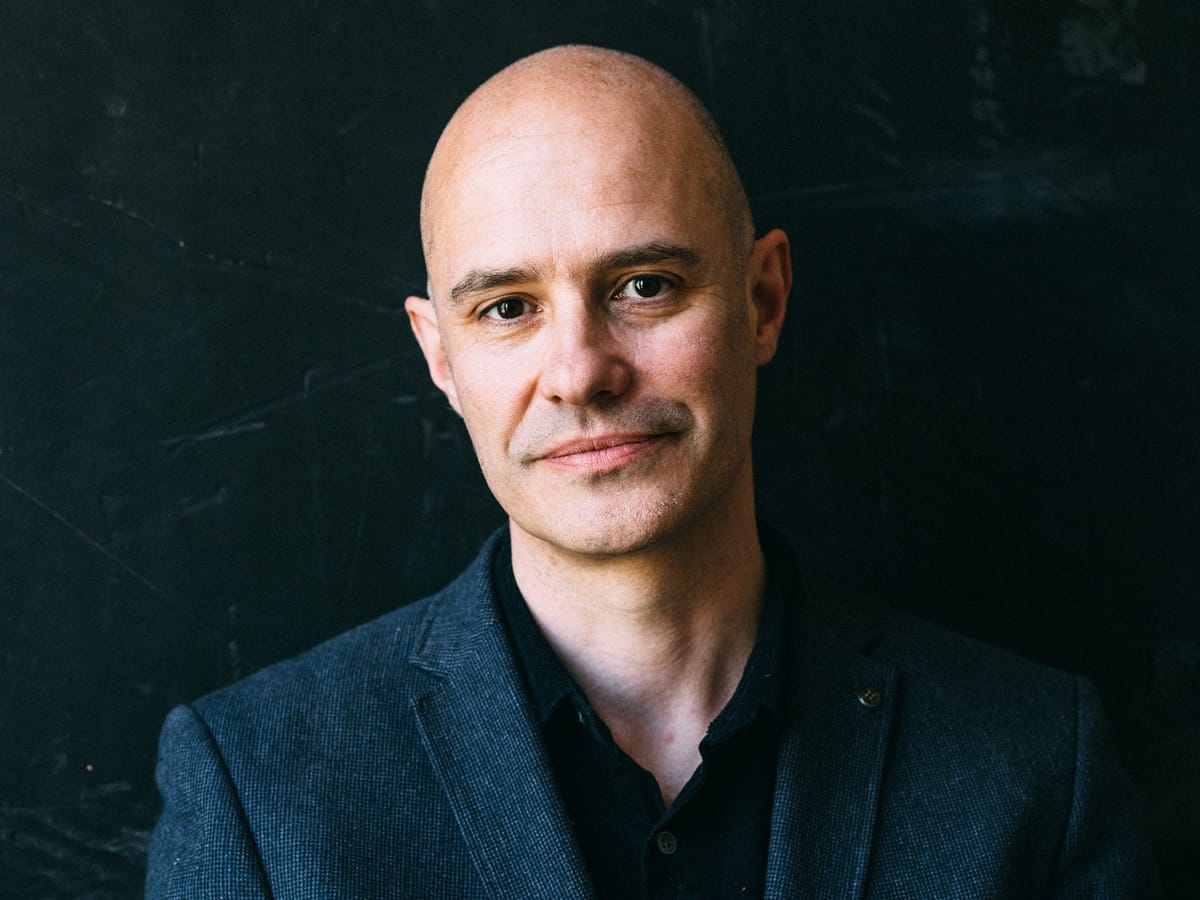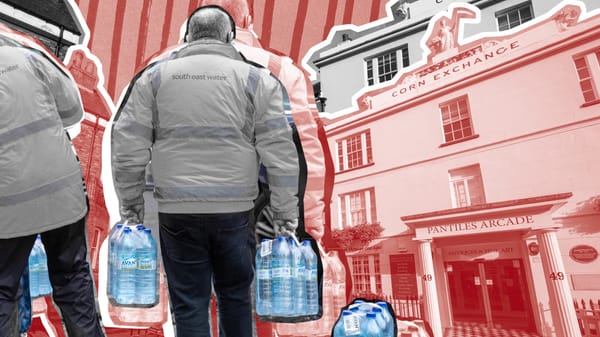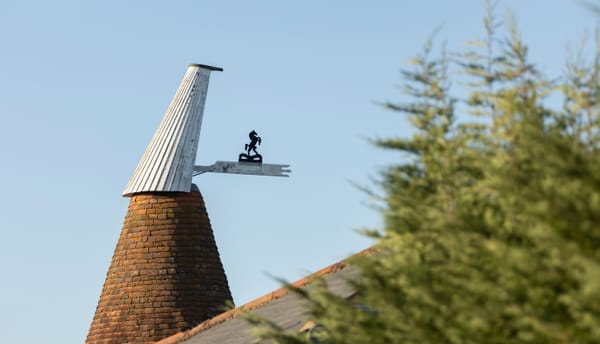“If you don't have hope, you're essentially complicit in the thing you hate”
What we asked Dorian Lynskey, writer and podcaster

Dorian Lynskey is a music journalist who became a podcaster during the Brexit years and has written on dystopias. Steven met him at the British Library, where Dorian can be found researching Origin Story, the successful podcast he co-hosts. They talked about podcasting, if Remain could have won the referendum, where hope can be found, and lots more.

What is your official occupation?
I think that I am a journalist, author and podcaster now.
How did you come to be a podcaster? What was the first step?
That was Spring 2017. A friend called Andrew Harrison, who I'd worked for on various music magazines, was moving into podcasting. They already had a culture podcast. He approached me here, in fact, in this very area (a café outside the British Library) to say that he wanted to do a podcast, an anti-Brexit podcast, and would I consider hosting it? That was called Remainiacs. I hadn't done any podcasting, but like a lot of people, I was very agitated about Brexit. I thought it was a really interesting idea that there was no outlet for people who were explicitly anti-Brexit and wanted to cover the story from that angle, not from a neutral political angle that you would get from places like The Guardian and The New Statesman in their podcast coverage. Even though they were obviously remain publications, they still had that sort of BBC approach. Not neutrality, but of trying to get some balance.
What we realised we could do, which you couldn't get anywhere else, was just be really passionate and robust about it. We realised it was even just being able to swear, being able to give pro-Brexit politicians stupid nicknames, being able to have running jokes. It felt like people needed that emotionally. They just didn't want to hear ‘now we've got a pro-leave politician to provide balance.’ We launched the week that Theresa May called the 2017 election just by chance. We found that we could get all kinds of guests, could get people who were remain activists, MPs. But we could also get public figures who sympathised like Al Murray or Mark Gatiss. It was a really nice period, and so I felt that I was able to use my political knowledge, but also this experience of interviewing, because that's what I'd mostly done for the preceding 20 years. I was doing album reviews and essays and things like that, but I'd mainly been interviewing musicians, actors and authors, so I knew how to do that. But then there was this whole other skill set, which I was developing on the fly, which was how to organise a panel, how to fold guests into the vibe of the regular panellists, how to then do that on stage at live shows.
It was really enjoyable. Particularly since, I think like a lot of journalists, it's very painful when you're listening back to an interview. You might hear yourself doing a stupid laugh or a question that's way too long. I hated hearing my own voice, and with podcasting, you have got to get over that. I felt much more confident talking and doing this live. It was not live, obviously, but it's not edited much. This whole thing that I had, listening to me interviewing, was quite uncomfortable. I was doing all this sleight of hand on the page and obviously eliminating my bad questions and making the interview like smoke and mirrors, making it seem very different on the page and then on podcasts, you can't do that, and you just have to get better. But you also get a bit more relaxed about how it sounds, and maybe one of your questions is going to be long-winded or maybe you're not going to get the answer that you wanted. Then you have to deal with it because you can't cover it up on the page later. You've got to make it work. The interview is the experience. There is nothing to write up. That was actually really nice and funny. Sometimes I find if I'm doing a lot of podcasting, I actually have to make sure that I'm also doing some writing and specifically some interviews, because otherwise I forget how to do that, because I'm so used to doing the talking version of my opinions or questions.
Wouldn't it be great if we just explained the origins of neoliberalism? What does it mean?
What led to the creation of your Origin Story podcast?
Well, when we started Remainiacs, we had somebody, Peter Collins, who Andrew knew, a former Economist journalist. Then we needed somebody else. He was quite dry, we needed somebody else who combined knowledge, but with a kind of looser, more informal style. We really liked Ian Dunt's writing on politics.co.uk and his social media presence. I'm sure that I must have had some interactions with him on Twitter. Andrew suggested him, and I said, he's the person I suggest. We met up with him, just to see what he thought, if it was something he wanted to do. Because early on, for quite a few months, it was unpaid. See if we got on, which we did. Peter left, other people came in, but me and Ian were always the core of the podcast.
In ‘22, Ian suggested that we do a podcast together. We talked about what that might be. We wanted something that was broad, but not so broad that it didn't make any sense. At first, he was like, ‘We could just talk about anything we're interested in.’ I was like, ‘I think we need a concept.’ The concept originally became the history of certain ideas, because we got so annoyed with the way that, particularly in online discourse, certain words would be used, ‘left,’ ‘right,’ and ‘centre’ in an either deliberately misleading way or just ignorant. Wouldn't it be great if we just explained the origins of neoliberalism? What does it mean? As we've gone on, we've made it a bit more narrative. Not so many of these very broad concepts with a story. We did one on satire. We started with the ancient Greeks, and we're going up to The Onion or whatever. We do try and still do the history of certain ideas for sure, but we found ourselves leaning towards more people to more events. Do Winston Churchill, do Margaret Thatcher, we do Martin Luther King, we do events like the Partition of India, because the storytelling is very exciting and so we're always trying to explain things in a way that are relevant to politics now.
My take was that it's a history podcast, with a current affairs slant, and Ian's interpretation of it is that it's a current affairs podcast, using history. What are people talking about? What are people arguing about if it's something that seems relevant now? People were throwing the word eugenics around. What actually is eugenics? We wanted it to be useful, and sometimes we cover contemporary ones, like Russell Brand. Not because we're fascinated by Russell Brand per se, but it was both a story of radicalisation and how you can go from the left via conspiracy theories to the right. But it was also a story, I think, about how popular culture changed and how tolerated his misogyny was in the 2000s. What happens is that these topics that we take on, some of them we know how they're going to work straight away. Other times we don't. It might be one of Ian's suggestions that I didn't quite understand, or vice versa. But we just know from experience now that it will be interesting.
Is there a clear division of labour?
The bonus episodes, it's very clear, because it's almost a solo podcast with a listener. The other person will know stuff, they'll ask interesting questions, they'll make interesting observations, but the bulk of the research and the storytelling is one of us. In the regular episodes, we tend to split up angles or periods. With Thatcher, I was very much doing from birth up to the Falklands War, and Ian was leading on the later bit. But then both of us would make sure that we knew a fair amount about what the other person was doing so that we didn't just sit back.
How did that lead to the Origin Story books?
That was Ian's publisher, his regular publisher. We had interest from a few publishers after the first season, and Ian's publisher had the idea of a series. We'd start with three. There may be more, but we started with fascism, conspiracy theory, and centrism. That was a whole other experiment, because neither of us had written books in partnership before. That was quite a fun experience, because we thought we would argue a lot. We thought that was the thing, because we've got quite different styles. But actually, you just work them out, even things like paragraph length. I write quite long paragraphs, Ian likes really short ones. We just end up writing medium-sized ones. With the audiobook, we had to read alternating chapters, and because of the way that we've done it, each chapter one person would lead, then the other person would add bits, and then we'd edit, and then we'd hybridise it. There were definitely chapters where I had done the bulk of the writing, but he was the one reading them, and vice versa. It did become quite hard. There are definitely lines in there, individual lines, they're very clearly mine, or they're very clearly his.
But overall, I felt that we just got a really nice blend of voices. It was interesting because I've never been an editor, really. But I was editing his text, and he was editing my text, and then we go back and forth, ‘actually I really don't want you to cut that bit’ or ‘I think that that edit loses a really important nuance’ or ‘I really love that quote, I want to keep it in.’ There's just a lot of mutually respectful compromise involved, which was great, because the podcasting teaches you already to be more collaborative. It's a different thing to being a journalist. If you're an author, if you're writing a book, a copy editor can do this and that. But you don't have to go with their suggestions. Ultimately, if the author insists on something, the author gets their way. With journalism, the editor has more power. They can genuinely go, ‘I don't like this intro.’ You can push back. You can't win if they really don't like it. They're paying you. In both of those cases, there's an imbalance. Whereas with the origin of the podcast and the books, me and Ian are entirely equal. If one person doing the work is more knowledgeable about one area, etc. Overall, you have to be equal, and you have to agree, and you have to learn to be a bit more flexible, which I think is a good life skill, particularly at this age.
Is there a possibility of further books?
Yeah, it would be good to write more. It was very stressful. Nothing's confirmed. It also depends on individual books that me and Ian might want to write, or whether there's another way of doing a book tied to an origin story. But funnily enough, I just read a Substack post by a non-fiction author, who said how hard it was to sell non-fiction books, how hard it is to market. You can do all this social media activity, you can do all these book events, and it might not make a huge difference. Actually, a lot of non-fiction authors that she knew were instead channelling that research into podcasts, where you can build up this loyal following. The money is better. If you can get to a certain level of support on Patreon, then the money is better. Right now, I'm working on a bonus episode and, as usual, over-researching. Getting a book and I probably don't need this book, and then you discover there's a whole other area, I have no idea about, and then it makes it so much richer and it’s a really strong bonus episode and there is enough research for me to start writing, probably a short book, or certainly a chapter in a book, but I'm thinking maybe, the podcast is the better way to do this. It's just a format. You're going to reach more people. We have maybe 50,000 listeners. It's hard to sell 50,000 books. In terms of audience and instant reward, maybe podcasting is better.
As you mentioned, you have written your own books. One of them is The Ministry of Truth. How aware of George Orwell were you before you started that project?
Well, with anything that I write about or anything I do for the podcast, as soon as you commit yourself to digging into something, you know how much you don't know. Obviously, I've read Orwell's Nineteen Eighty-Four and Animal Farm. I had read all of his essays. You come across him quoted all the time. I knew the basic outline of his life.
The idea came about because I was really interested in dystopian fiction, how much dystopian fiction there was. I love tracing influence. I love doing it in music, literally finding out when was the first record to use a wah-wah pedal. What effect did that have? Where did this genre start? How did soul suddenly become political?
I got interested in doing that with fiction and was going to maybe do a history of dystopian fiction. And then immediately I realised that most of it comes from Nineteen Eighty-Four and that Orwell had read pretty much all the important dystopian fiction up to that point. If you were doing a history of dystopian fiction, you'd have Orwell in the middle, you'd have some books flowing into it, and then a whole load of books flowing out of it. Then I thought, I could do a biography of Nineteen Eighty-Four, which was therefore partly a biography of Orwell, but because it's the story of the book, you get to follow its influence and its life after he dies. I don't know that there's many books that you can do that with, where the influence is so broad and so massive and then it cuts across all these different fields, not just in fiction. It's in politics and it's in journalism, it's even in psychology. That just really appealed to me.
What I find with my books is I'm always trying to cover a lot of things. I'm always interested in a lot of things. I've never done a book that is just about one subject, really. It's always trying to accommodate all these different things that are interesting. The book is the first book about Orwell that has a significant bit about David Bowie and his attempts to do a rock musical version of Nineteen Eighty-Four, because the Orwell experts aren't that interested, but I was really interested in that, and I'm interested in how it influenced different movies. I've realised that the way I approach things is bringing in a lot of the high, low and middle brow and spotting all these connections and influences.
Looking back, could remain have won the referendum? Or was it always destined to fail?




